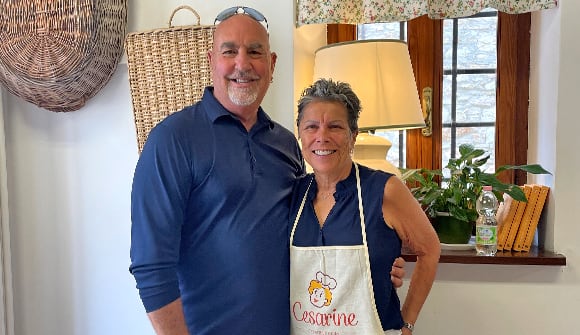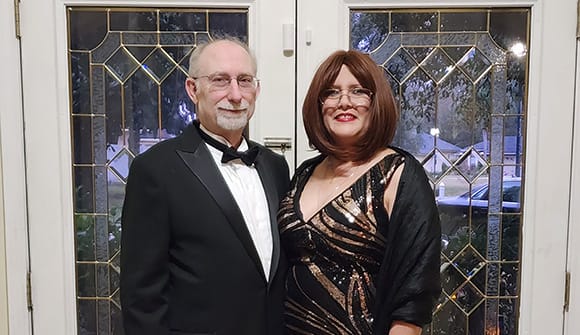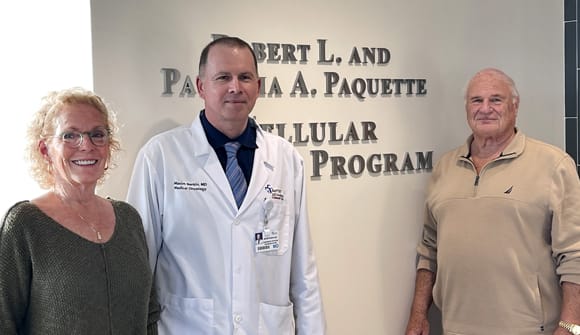Advances in cancer care
The breakthrough therapies bringing hope to people battling cancer.
Article Author: Deborah Circelli
Article Date:

New treatments designed to boost the immune system and more precisely target cancer cells are extending the lives of people with cancer once considered incurable. The therapies, which are currently available at or coming soon to Baptist MD Anderson Cancer Center, harness the latest technology and research to provide hope to people with metastatic (spread) or recurrent disease.
Immunotherapy: Enhancing the body’s disease-fighting power
When you get sick, your immune system springs into action to try to fight the pathogen that’s making you ill. Immunotherapy is a treatment – often used in combination with chemotherapy, radiation and/or surgery – that uses the immune system to find and fight cancer cells.
“Immunotherapy has changed the disease process,” said Joe B. Putnam, Jr., MD, FACS, a thoracic surgeon and medical director of Baptist MD Anderson Cancer Center. “Many patients even with advanced stage or metastatic disease who previously would have a very short survival of weeks to months are now seeing their lives extended from months to years based on the response they have to this treatment. We’re making progress every day. We see people living longer and that’s so rewarding.”
John Vu, MD, a medical oncologist focused on skin and lung cancers, said immunotherapy has extended life expectancy for people with metastatic melanoma who 10 years ago wouldn’t have survived a year, but now have a 50% chance of being alive in five or more years.
“Immunotherapy has changed the whole paradigm,” Dr. Vu said. “Many of these patients go on to have stable cancer or no signs of cancer for many years.”
Immunotherapy has also shown promise for uterine and cervical cancers.
Gynecologic oncology surgeon Jenny Whitworth, MD, said, “I have several patients who, if treated 15 years ago, wouldn’t have survived this long, but are now in remission and have been for six or seven years since we have these new treatments to offer people.”
Cellular therapy and stem cell transplants
Advances in treatments, including the availability of cellular therapy, are adding years to the lives of patients with blood cancers like multiple myeloma, aggressive lymphomas and acute lymphoblastic leukemia.
Baptist MD Anderson’s new Stem Cell Transplantation and Cellular Therapy Program, which is modeled after that of MD Anderson Cancer Center in Houston, one of the nation’s leading cancer centers, is helping extend lives even further.
“There have been tremendous advances in oncology and specifically hematologic oncology, meaning blood cancers,” said Maxim Norkin, MD, PhD, a hematologist-oncologist with Baptist MD Anderson and medical director of the Stem Cell Transplantation and Cellular Therapy Program. “A lot of blood cancers were incurable, and patients previously had a short life span. The outcomes have drastically changed. Life expectancy is now exceeding 10 years and the quality of life has dramatically improved with treatments, which not only became more effective, but also less toxic.”
Cellular therapy, or chimeric antigen receptor T-cell (CAR T cell) therapy, for the patients with aggressive lymphomas, for example, is extending life-expectancy from several months to a 40% change of being in long remission or even cured.
Baptist MD Anderson’s cellular therapy program launched to a select group of patients in 2025, with the stem cell transplant program expected to launch in late summer 2026.
How cellular therapy works
CAR T cell therapy, which is a form of immunotherapy, uses a patient’s own genetically engineered immune cells to specifically target a wide variety of blood cancers.
“We are talking about hard-to-treat blood cancers,” Dr. Norkin said. “We’ve seen significant improvement and duration of remission with these lines of treatment, which would be impossible otherwise.”
The T cells (white blood cells) are taken from the patient’s blood, genetically modified in a lab and put back into the patient’s body. The cells are reprogrammed to recognize and eliminate cancer cells more effectively. This process could take three to five weeks.
“You can treat them in certain ways and sometimes even change their genetics in a way that makes them super cancer fighters and then reinfuse them into patients and cure patients of their disease,” said Dr. Putnam.
“Cellular therapy, which is established under the umbrella of our Stem Cell Therapy Program, is really transformative in terms of cancer care,” said Tom Dragovich, MD, PhD, head of the Division of Cancer Medicine and Baptist MD Anderson’s medical oncologist-in-chief. “I believe that some of the most impactful advances will be made in that area in the next five to 10 years. For a lot of cancer patients and their families, that means access to life-saving therapies here at home without having to go somewhere else and be in an unfamiliar setting.”
Stem cell transplantation will be phase two of the program. Stem cell transplantations help restore the body’s ability to produce oxygen-carrying red blood cells and rebuild the immune system, especially after intensive treatments like chemotherapy or radiation. It involves replacing damaged or diseased stem cells found in peripheral blood or bone marrow with healthy ones from either the patient or a donor.
Continued improvements in cellular therapy could expand the type of cancers that could benefit from the treatment, including breast and lung.
Baptist MD Anderson’s new cellular therapy and stem cell transplantation program was made possible through the generous donation of grateful patients Bob and Patricia Paquette from Hilton Head, South Carolina.
“Hot chemotherapy” and targeted treatments
Another way of more directly targeting cancer cells is a treatment called hyperthermic intraperitoneal chemotherapy (HIPEC), also known as “hot chemotherapy,” which delivers heated chemotherapy drugs directly into the abdomen. The procedure can be used to treat colorectal cancer, appendiceal cancer, ovarian cancer, peritoneal mesothelioma and gastric (stomach) cancer.
The HIPEC technique includes warming and administering chemotherapy directly into the abdomen to treat the microscopic disease that could be lingering in the abdominal lining. The treatment applies a high concentration of chemotherapy to the abdominal tumors without as much systemic absorption, therefore reducing side effects.
“Hyperthermic intraperitoneal chemotherapy allows us the best chance to eradicate the tumor, and it may provide the best hope to those who have complex and advanced abdominal cancers,” said Niraj Gusani, MD, FACS, chief of Surgical Oncology at Baptist MD Anderson.
When it comes to traditionally hard-to-treat liver cancer, a new hepatic artery infusion treatment delivers high-dose therapy into the liver through a surgically implanted pump, resulting in less damage to other parts of the body.
“It’s a more effective treatment for the liver and has the potential to shrink tumors and make them more operable down the line,” Dr. Gusani said.
Disease DNA: Molecular profiling and genetics
Each person is different, and the same goes for each tumor. Next-generation sequencing or molecular profiling looks at genes and chromosomes to determine a person’s risk for various cancers, and also analyzes a specific tumor’s makeup to provide individualized approaches.
“Treatments have evolved from one-size-fits-all to more precise, mutation-driven personalized care which is often less toxic and more effective than traditional chemotherapy,” said Robert Zaiden, MD, FACP, director of Infusion Centers at Baptist MD.
Since every cancer and every patient responds differently, understanding genetic and molecular characteristics is important in providing precision health and ensuring those positive results. Testing analyzes hundreds of cancer genes to understand treatment for each patient.
“If someone has a specific mutation, they may have a better option for a more effective treatment, with fewer side effects,” Dr. Vu said. “We are doing that across the board now and seeing better patient results.”
Laila Samiian, MD, FACS, chief of Breast Surgical Oncology, is seeing the benefit with breast cancer patients.
“Molecular profiling of the tumor provides more accurate information at the DNA level to determine whether patients would benefit from chemotherapy or if they can just take endocrine therapy alone,” Dr. Samiian said.
Program for prostate cancer, from treatment to survivorship
About one in eight men will be diagnosed with prostate cancer in their lifetime. For patients with this disease, Baptist MD Anderson offers a comprehensive program from diagnosis and treatment through management and survivorship.
The treatment techniques aim to spare nerves and tissue to preserve sexual function, urinary continence and more.
Urologic surgical oncologist Sumit Isharwal, MD, said focal therapy for prostate cancer, for example, is a minimally invasive treatment approach that targets only the cancer portion of the prostate, aiming to preserve the surrounding healthy tissue and reduce the side effects associated with surgery or radiation. He said this method is ideal for men with localized, intermediate-risk prostate cancer where the disease is limited to one part of the prostate and the lesion is visible on the imaging.
Up to 85% of men experience sexual side effects following prostate cancer treatment and up to 15% experience issues with urinary control. To help patients recovering from prostate cancer manage side effects, Baptist MD Anderson also has a dedicated specialist providing men’s health services. Lael Stieglitz, MD, MPH, works alongside specialists in physical therapy, nutrition, spiritual care and more to help patients and their families return to a new normal. She and her team offer many new treatments for sexual and urinary side effects.
Baptist MD Anderson Cancer Center has everything you need to take on cancer, from the latest breakthrough treatment options to emotional support for you and your family. To learn more, visit BaptistMDAnderson.com or call 1.844.632.2278.



